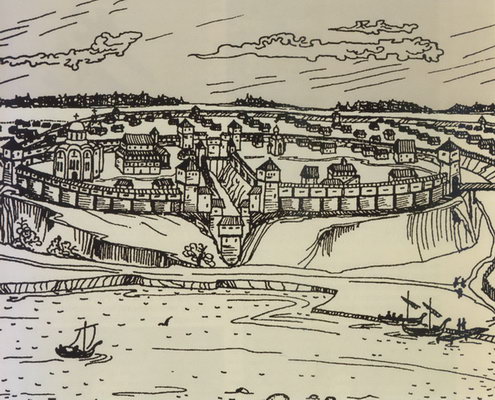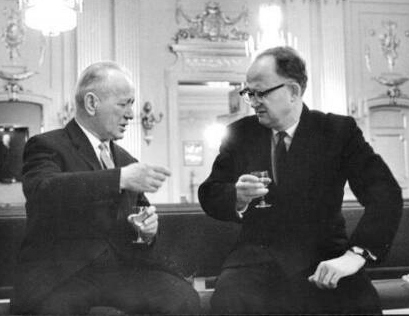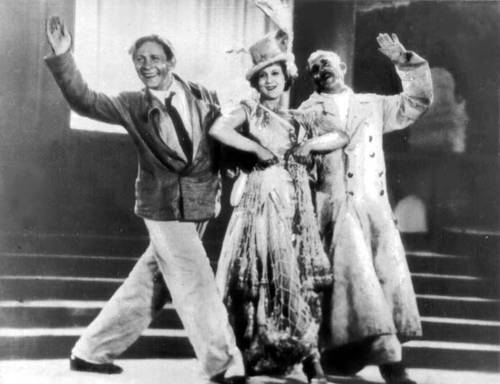|
Yevgenia Feigenberg
Yevgenia Feigenberg (), also known as Yevgenia Solomonovna Khayutina (); (1904, Gomel – November 21, 1938, Moscow) was a Soviet editor, host of a literary salon, and the last wife of Nikolai Yezhov. Biography Born in Gomel in 1904, she was the youngest child in a large merchant family of Solomon (Zalman) Leibovich Feigenberg and Esfiri Mikhailovna (Meilakhovna), née Krymskaya. She married for the first time at the age of 17 to Lazar Khayutin (1898-1948), with whom she moved in 1921 to Odessa, where she worked in the editorial office of the local magazine. During this period, she met Odessa writers Valentin Kataev, Yury Olesha, and Isaac Babel. She married a second time to the former Red commander, Alexander Fedorovich Gladun, whom she met during one of his business trips to Odessa while serving as director of the Moscow publishing house “Economic Life”. She moved to Moscow with him in 1924. In 1927, she accompanied Gladun when he was sent on diplomatic assignment in London ... [...More Info...] [...Related Items...] OR: [Wikipedia] [Google] [Baidu] |
Gomel
Gomel (, ) or Homyel (, ) is a city in south-eastern Belarus. It serves as the administrative centre of Gomel Region and Gomel District, though it is administratively separated from the district. As of 2025, it is the List of cities and largest towns in Belarus, second-largest city in Belarus, with 501,193 inhabitants. Etymology There are at least six narratives of the origin of the city's name. The most plausible is that the name is derived from the name of the stream Homeyuk, which flowed into the Sozh river, river Sozh near the foot of the hill where the first settlement was founded. Names of other Belarusian cities are formed along these lines: for example, Polotsk from the river Palata (river), Palata, and Vitebsk from the river Vitsba. The first appearance of the name, as "Gomy", dates from 1142. Up to the 16th century, the city was mentioned as Hom', Homye, Homiy, Homey, or Homyi. These forms are tentatively explained as derivatives of unattested ''*gomŭ'' of uncertain ... [...More Info...] [...Related Items...] OR: [Wikipedia] [Google] [Baidu] |
Mikhail Sholokhov
Mikhail Aleksandrovich Sholokhov ( rus, Михаил Александрович Шолохов, p=ˈʂoləxəf; – 21 February 1984) was a Russian novelist and winner of the 1965 Nobel Prize in Literature. He is known for writing about life and fate of Don Cossacks during the Russian Revolution, the civil war and the period of collectivization, primarily in his most famous novel, '' And Quiet Flows the Don''. Life and work Sholokhov was born in the Russian Empire, in the "land of the Cossacks" – the Kruzhilin hamlet, part of stanitsa Vyoshenskaya, in the former Administrative Region of the Don Cossack Host. His father, a Russian, Aleksander Mikhailovich Sholokhov (1865–1925), was a member of the lower middle class, at various times a farmer, a cattle trader, and a miller. Sholokhov's mother, Anastasia Danilovna Chernikova (1871–1942), the widow of a Cossack, came from Ukrainian peasant stock (her father was a peasant in the Chernihiv oblast). She did not becom ... [...More Info...] [...Related Items...] OR: [Wikipedia] [Google] [Baidu] |
1938 Deaths
Events January * January 1 – state-owned enterprise, State-owned railway networks are created by merger, in France (SNCF) and the Netherlands (Nederlandse Spoorwegen – NS). * January 20 – King Farouk of Egypt marries Safinaz Zulficar, who becomes Farida of Egypt, Queen Farida, in Cairo. * January 27 – The Honeymoon Bridge (Niagara Falls), Honeymoon Bridge at Niagara Falls, New York, collapses as a result of an ice jam. February * February 4 ** Adolf Hitler abolishes the War Ministry and creates the Oberkommando der Wehrmacht (High Command of the Armed Forces), giving him direct control of the German military. In addition, he dismisses political and military leaders considered unsympathetic to his philosophy or policies. General Werner von Fritsch is forced to resign as Commander of Chief of the German Army following accusations of homosexuality, and replaced by General Walther von Brauchitsch. Foreign Minister Baron Konstantin von Neurath is dismi ... [...More Info...] [...Related Items...] OR: [Wikipedia] [Google] [Baidu] |
1904 Births
Events January * January 7 – The distress signal ''CQD'' is established, only to be replaced 2 years later by ''SOS''. * January 8 – The Blackstone Library is dedicated, marking the beginning of the Chicago Public Library system. * January 12 – The Herero Wars in German South West Africa begin. * January 17 – Anton Chekhov's last play, ''The Cherry Orchard'' («Вишнëвый сад», ''Vishnevyi sad''), opens at the Moscow Art Theatre directed by Constantin Stanislavski, 6 month's before the author's death. * January 23 – The Ålesund fire destroys most buildings in the town of Ålesund, Norway, leaving about 10,000 people without shelter. * January 25 – Halford Mackinder presents a paper on "The Geographical Pivot of History" to the Royal Geographical Society of London in which he formulates the Heartland Theory, originating the study of geopolitics. February * February 7 – The Great Baltimore Fire in Baltimore, Maryland, destroys over 1,500 build ... [...More Info...] [...Related Items...] OR: [Wikipedia] [Google] [Baidu] |
Nomenklatura
The ''nomenklatura'' (; from , system of names) were a category of people within the Soviet Union and other Eastern Bloc countries who held various key administrative positions in the bureaucracy, running all spheres of those countries' activity: government, industry, agriculture, education, etc., whose positions were granted only with approval by the communist party of each country or region. While in the Russian language the term номенклатура has the same generic meaning as "nomenclature", in the context of the politics of the Soviet Union it refers to the "party and state nomenklatura", lists of persons vetted for key management, or "nomenklatura lists". Description Virtually all members of the nomenklatura were members of a communist party. Critics of Stalin, such as Milovan Djilas, critically defined them as a " new class". Richard Pipes, a Harvard historian, claimed that the nomenklatura system mainly reflected a continuation of the old Tsarist regime, as ... [...More Info...] [...Related Items...] OR: [Wikipedia] [Google] [Baidu] |
Semyon Uritsky
Semyon Petrovich Uritsky (; March 2, 1895 – August 1, 1938) was a Soviet general. He fought in the Imperial Russian Army during World War I before going over to the Bolsheviks. He was promoted to the rank of Komkor on November 11, 1935. He was a recipient of the Order of the Red Banner. He was head of the Soviet military intelligence from April 1935 to July 1937. During the Great Purge, he was arrested on November 1, 1937 and later executed at Kommunarka. He was rehabilitated in 1956. He was a nephew of Moisei Uritsky Moisei Solomonovich Uritsky (; ; – 30 August 1918), also known by his pen-name Boretsky () was a Bolshevik revolutionary leader in Russia. After the October Revolution, he was the chief of the Cheka secret police of the Petrograd Soviet. .... Bibliography * * * * References {{DEFAULTSORT:Uritsky, Sem 1895 births 1938 deaths People from Cherkasy People from Kiev Governorate Ukrainian people of World War I Russian military personne ... [...More Info...] [...Related Items...] OR: [Wikipedia] [Google] [Baidu] |
Leonid Utesov
Leonid Osipovich Utesov, also spelled Utyosov or Utiosov, born Lazar (Leyzer) Iosifovich Vaysbeyn or Weissbein (, Odessa – 9 March 1982, Moscow), was a famous Soviet estrada singer, and comic actor, who became the first pop singer to be awarded the prestigious title of People's Artist of the USSR in 1965. Biography Leonid Utesov was brought up in Odessa, Russian Empire and attended the Faig School of Commerce, from which he dropped out and joined the Borodanov Circus troupe as an acrobat. He started his stage career in 1911 in Kremenchuk, then returned to Odessa, changed his artistic name to Leonid Utesov, and performed as a stand up comedian with the Rosanov troupe and with the Rishelyavsky Theatre. In 1917, he won a singing competition in Gomel, Belarus, then performed in Moscow. In the 1920s, he moved to Leningrad and set up one of the first Soviet jazz bands. In Leningrad, he began collaboration with the popular composer, Isaak Dunayevsky, which turned out to be a breakth ... [...More Info...] [...Related Items...] OR: [Wikipedia] [Google] [Baidu] |
Sergei Eisenstein
Sergei Mikhailovich Eisenstein; (11 February 1948) was a Soviet film director, screenwriter, film editor and film theorist. Considered one of the greatest filmmakers of all time, he was a pioneer in the theory and practice of montage. He is noted in particular for his silent films '' Strike'' (1925), '' Battleship Potemkin'' (1925) and ''October'' (1928), as well as the historical epics '' Alexander Nevsky'' (1938) and ''Ivan the Terrible'' (1945/1958). In its 2012 decennial poll, the magazine '' Sight & Sound'' named his ''Battleship Potemkin'' the 11th-greatest film of all time. Early life Sergei Eisenstein was born on in Riga, in the Governorate of Livonia, Russian Empire (present-day Latvia), to a middle-class family. His family moved frequently in his early years, as Eisenstein continued to do throughout his life. His father, the architect Mikhail Osipovich Eisenstein, was born in the Kiev Governorate, to a Jewish merchant father, Osip, and a Swedish mother. Sergei ... [...More Info...] [...Related Items...] OR: [Wikipedia] [Google] [Baidu] |
Mikhail Koltsov
Mikhail Efimovich Koltsov () (The record of the birth of Moisey Fridlyand in the metric book of the Kiev rabbinate for 1898 ( ЦГИАК Украины. Ф. 1164. Оп. 1. Д. 442. Л. 138об–139.) – February 2, 1940), born Moisey Haimovich Fridlyand (), was a Soviet journalist, revolutionary and NKVD agent. He served as the editor-in-chief of the satirical magazine, ''Krokodil''. Biography Born in Kyiv, Koltsov was the son of a Jewish shoemaker Haim Movshevich Fridlyand and the brother of Boris Efimov. Koltsov participated in the Russian Revolution of 1917, became a member of the Bolshevik Party in 1918 and took part in the Russian Civil War. A convinced communist, he soon became a key figure of the Soviet intellectual elite and arguably the most famous journalist in the Soviet Union, chiefly because of his well-written satirical essays and articles in which he criticised bureaucracy and other negative phenomena in the Soviet Union. Koltsov edited and founded popular jou ... [...More Info...] [...Related Items...] OR: [Wikipedia] [Google] [Baidu] |
USSR In Construction
''USSR in Construction'' () was a journal published in the decade of 1930 to 1941, as well as briefly in 1949, in the Soviet Union. It became an artistic gem and counter-current in the first year of socialist realism. With elements such as oversized pages and multi-page fold-outs, each issue exists as an elaborate artistic creation. The first issue of the journal was edited by Maxim Gorky. The journal was published in Russian, French, English, German, and, from 1938, Spanish. The journal informed readers abroad of the hyper-construction taking place within the nation, and portrayed the emergence of the Soviet Union as a leading industrial power. The self-proclaimed purpose of the magazine was to "reflect in photography the whole scope and variety of the construction work now going on the USSR”. By focusing on a single theme or initiative in each issue, the contributing artists produced a work which effectively conveyed the heroic efforts of the Soviet people in fulfilling th ... [...More Info...] [...Related Items...] OR: [Wikipedia] [Google] [Baidu] |
Moscow
Moscow is the Capital city, capital and List of cities and towns in Russia by population, largest city of Russia, standing on the Moskva (river), Moskva River in Central Russia. It has a population estimated at over 13 million residents within the city limits, over 19.1 million residents in the urban area, and over 21.5 million residents in Moscow metropolitan area, its metropolitan area. The city covers an area of , while the urban area covers , and the metropolitan area covers over . Moscow is among the world's List of largest cities, largest cities, being the List of European cities by population within city limits, most populous city entirely in Europe, the largest List of urban areas in Europe, urban and List of metropolitan areas in Europe, metropolitan area in Europe, and the largest city by land area on the European continent. First documented in 1147, Moscow became the capital of the Grand Principality of Moscow, which led the unification of the Russian lan ... [...More Info...] [...Related Items...] OR: [Wikipedia] [Google] [Baidu] |
Sochi
Sochi ( rus, Сочи, p=ˈsotɕɪ, a=Ru-Сочи.ogg, from – ''seaside'') is the largest Resort town, resort city in Russia. The city is situated on the Sochi (river), Sochi River, along the Black Sea in the North Caucasus of Southern Russia, with a population of 466,078 residents, and up to 600,000 residents in the urban area. The city covers an area of , while the Greater Sochi Area covers over . Sochi stretches across , and is the longest city in Europe, the fifth-largest city in the Southern Federal District, the second-largest city in Krasnodar Krai, and the Black Sea#Urban areas, sixth-largest city on the Black Sea. Sochi hosted the 2014 Winter Olympics, XXII Olympic Winter Games and 2014 Winter Paralympics, XI Paralympic Winter Games in 2014. It hosted the alpine and Nordic Olympic events at the nearby ski resort of Rosa Khutor Alpine Resort, Rosa Khutor in Krasnaya Polyana, Sochi, Krasnodar Krai, Krasnaya Polyana. It also hosted the Formula 1 Russian Grand Pri ... [...More Info...] [...Related Items...] OR: [Wikipedia] [Google] [Baidu] |






